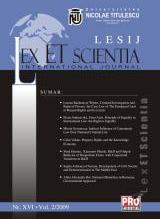ECONOMIA INFORMAŢIEI, INSTRUMENT DE ANALIZĂ AL NOII MICROECONOMII
INFORMATION ECONOMICS, INSTRUMENT OF ANALYSIS IN NEW MICROECONOMICS
Author(s): Maria Zenovia GrigoreSubject(s): Economy
Published by: Universitatea Nicolae Titulescu
Keywords: information economics; adverse selection; signaling theory; moral hazard; principal – agent model
Summary/Abstract: In the New Microeconomics the walrasian postulate of perfect information is replaced by two theorems concerning production of information: 1. the acquisition and dissemination of information raise production costs; 2. the specialisation in information activity is efficient; there are specialists in the production or use of information. Information economics or the economics of information studies decisions in transaction where one party has more or better information than the other. Incomplete and asymmetric information could generate two types of risks: adverse selection, which can be reduced with signaling games and screening games, and moral hazard, studied in the frame of agency theory, by the principal-agent model. The principal-agent model treats the difficulties that arise when a principal hires an agent to pursue the interests of the former. There are some mechanisms that align the interests of the agent in solidarity with those of the principal, such as commissions, promotions, profit sharing, efficiency wages, deferred compensation, fear of firing and so on.
Journal: LESIJ - Lex ET Scientia International Journal
- Issue Year: XVI/2009
- Issue No: 2
- Page Range: 354-364
- Page Count: 11
- Language: English

